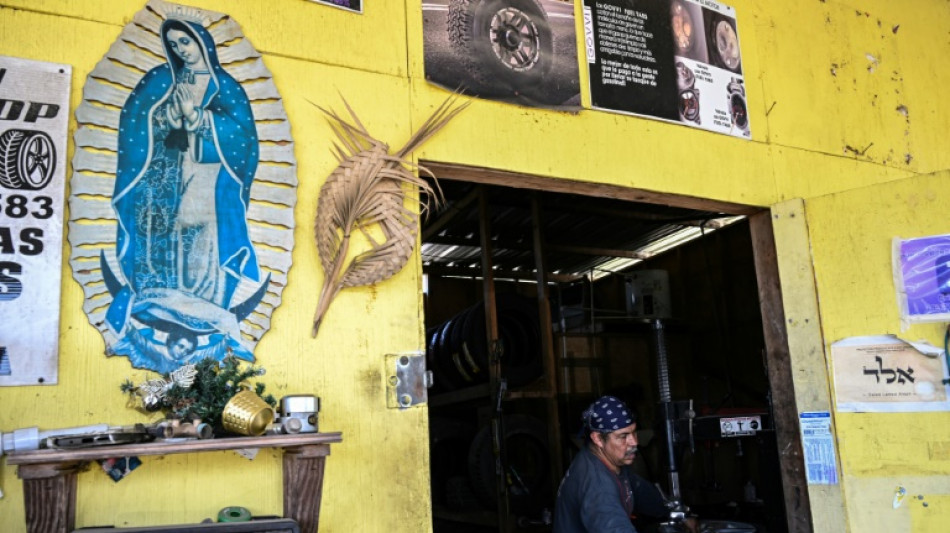

They work, pay taxes and call US home -- but risk deportation
As he has done for years, Erik Payan had just opened up his tire repair shop in the small Texas town of Cleveland on February 24 and was getting to work when armed and masked US immigration agents swooped in to arrest him and take him away.
"They've got me," he told his distraught wife over the phone.
While it wasn't an unheard of scene in the United States, such incidents have drawn the glare of scrutiny as President Donald Trump, newly returned to the White House, has lashed out at migrants with particularly violent rhetoric -- raising concerns among many who lack papers that they may be swept up at random for expulsion.
- Overstayed visa -
Payan, a Mexican, has lived for 20 of his 51 years in the United States. He entered on a work visa, but stayed on after it expired, making a life with his wife and three daughters, the youngest of them US-born.
His store is licensed, he pays taxes and a mortgage, and is his family's main breadwinner. One daughter is disabled; a granddaughter has a heart condition.
Payan goes to church on Sundays and his neighbors vouch for him. His roots are now in Texas, but he lacks the documents to stay legally.
His situation is much like many of the millions of other undocumented people living in the United States -- a group estimated officially at 11 million but possibly closer to 14 million, according to a recent report from the NGO Migration Policy Institute.
- No criminal record -
Up to now, the undocumented were largely left alone, many working in some of the country's most arduous and lowest-paid jobs. But Trump insists that their numbers include drug dealers, violent criminals and terrorists, and has vowed to deport millions of them.
Payan, who has no criminal record, was swept up in one of the hundreds of nationwide raids Trump launched immediately upon his return to the White House.
"I cried, but crying wasn't going to help," said his wife, 55-year-old Alejandrina Morales, who described their case on social media.
The tears quickly turned to determination.
"I'm going to fight, I'm going to defend my husband," she recalls thinking.
Payan's attorney Silvia Mintz said that despite Trump's promises of mass deportation, a process must be followed.
- 'They have options' -
"That's not how really the law works," Mintz said. "Anybody who is in the United States has the right to due process, and... a judge gets to decide" whether they remain in detention or are deported.
Most importantly, she added, "They have options."
Using documentation to prove Payan had been a law-abiding, tax-paying worker for years, Mintz managed to secure his release on bail after a 27-day detention.
Now begins a fight to legalize him.
Mintz said undocumented immigrants can fight to stay by demonstrating that they have ties to the country and family members who could be harmed by their absence.
There is also a possibility for children born in the United States -- who enjoy "birthright citizenship," though Trump is trying to end that -- to legalize their parents once they turn 21.
But in the meantime, the risk of detention and deportation persists.
Mintz argues that the country desperately needs immigration reform to open a path to legal residency and citizenship.
- Billions in taxes -
The first thing Payan did upon his release was to reopen his tire store.
"We are not criminals, we're hard-working people," he said. "Yes, we're not from here, but without the support of Hispanic workers, this country is nothing."
He went on: "I'm not saying bad people haven't come from our countries, but there are more of us good people. Let them concentrate on finding the criminals."
In 2022, undocumented workers paid an estimated $97 billion in taxes, according to the group Americans for Tax Fairness.
Deporting millions of them, it said, could spark a devastating contraction, worse than during the 2008 financial crisis.
"They have to pay taxes... but unfortunately the law prohibits them from getting any incentive or anything back," said Cesar Espinosa, executive director of the NGO FIEL, which works with immigrants.
He said it was important to recognize the contributions migrants make, and to push for immigration reform, "so other people can have access to the American dream."
During Payan's detention, he said, he sometimes slept in unheated rooms and caught a severe cold.
He's still coughing, but now he's home. His customers honk as they drive past his tire store, celebrating his return.
His wife Alejandrina celebrates too: "They had taken the captain of my boat," she said, "and I was rowing alone."
O.Larsson--RTC


